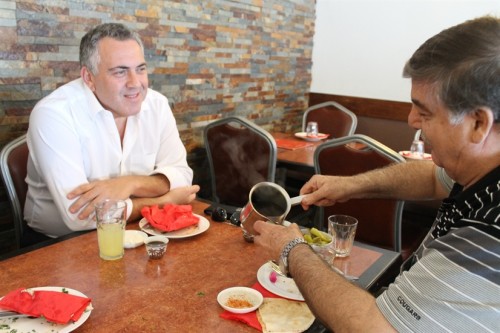By Michelle Grattan, University of Canberra
JOE Hockey is so committed to the end of the “age of entitlement” he apparently has tried unsuccessfully to pay for his own bulk billed medical services.
As the Treasurer continues to soften up the public for budget cuts in Medicare and other health areas as well as frontline social services, he agreed with radio presenter Alan Jones’ proposition that “you and I shouldn’t be getting one cent of taxpayers’ money for health”.
“I accept that,” Hockey said. “I often, if I go to .. just a bulk bill doctor, I offer to pay and they won’t accept it.”
Changes to Medicare, altering the timing of the national disability insurance scheme, as well as cuts to welfare are among the most sensitive issues being debated in the budget’s preparation.
Summing up the budget cuts Hockey said: “It’s not going to be a case of a few do the major sacrifice. Everyone is going to have to make a contribution – big business, small business, all people from all demographics.”
Hockey gives the strong impression of being after as much as he can get in terms in savings, but the government is also constrained by politics and election promises.
On health, where there is speculation about means testing of bulk billing, Hockey told a news conference: “I would say to the Labor party, that seems to rail against paid parental leave for higher income women, why is it okay for higher income women or higher income men to receive free health care when they can clearly afford to make a contribution and don’t?”
The health system should help the most disadvantaged, but “the fact is that where people can afford to make a contribution to their health care they should. If we want to have the very best health system in the world, there’s no such thing as a free health system for people that can afford to make a contribution. I have private health insurance – a lot of people do. We are making a contribution to our health system”.
While it seems clear means testing or some other impost on the better off will be imposed on Medicare, how the government is going to manage the huge cost in later years of the disability insurance scheme, and keep faith with its promises, is less obvious.
According to Hockey’s figures, in 2017-18, there would be a 125% increase on the year before in disability service spending as the full rollout of the NDIS neared.
Hockey said it was a matter of getting quality of service in an affordable manner. A recent report on the scheme had identified that the current structure was like taking a plane into the air that was still being built.
“So clearly, it’s not about the money in relation to the NDIS – it is about the quality of services and the outcome and making sure we don’t end up with another [Labor] pink batts program or a $900 cheque program or a school halls program.”
Assistant Minister for Social Services Mitch Fifield said the government was determined to implement the NDIS in full. The scheme’s timelines were in bilateral agreements with the states and could only be changed by renegotiation.
The government was waiting for advice from the NDIS board, on the basis of the capability review it had commissioned, about the ability to deliver the scheme according to the time lines in those agreements.
Fifield insisted the government was not looking for ways to delay the NDIS but for ways to deliver it, but he pointed out that Labor, in bringing forward the commencement of trial sites a year ahead of the timetable recommended by the Productivity Commission, had “compromised the foundations”.
The scheme had been costed at about $22 billion for a full roll out. “Half of that is Commonwealth money, half is state, and about $8-$9 billion of that amount will be new Commonwealth money”.
Fifield dismissed any suggestion that the Commission of Audit would say the government’s funding should be cut back. The commission had as one of its principles that government should do things that only government could do – and proper support for disabled people was “core government business”.
Asked about welfare spending, Hockey said that no one wanted to hear that they might receive less money from the government and so of course people did not want any changes. But some areas of welfare had “massive growth, well beyond the norm”.
Meanwhile, as the budget preparation enters its final intense weeks ahead of its May 13 delivery, Prime Minister Tony Abbott has agreed to dismissed Treasury secretary Martin Parkinson staying on in his job until after the November G20 leaders’ meeting.
Parkinson was sacked in a mini purge of departmental heads after the election though, unlike three other secretaries, he was to remain in place until mid this year. The removal of Parkinson has caused some embarrassment and difficulty for Hockey who wanted him retained. Parkinson is working closely with Hockey in the budget process.
Parkinson was anxious to stay for the G20. His earlier role as head of the now defunct climate change department is regarded as being a key factor in the Prime Ministerial decision to remove him.
![]()
Michelle Grattan does not work for, consult to, own shares in or receive funding from any company or organisation that would benefit from this article, and has no relevant affiliations.
This article was originally published on The Conversation.
Read the original article.
[Photo via joehockey.com]
Who can be trusted?
In a world of spin and confusion, there’s never been a more important time to support independent journalism in Canberra.
If you trust our work online and want to enforce the power of independent voices, I invite you to make a small contribution.
Every dollar of support is invested back into our journalism to help keep citynews.com.au strong and free.
Thank you,
Ian Meikle, editor





Leave a Reply